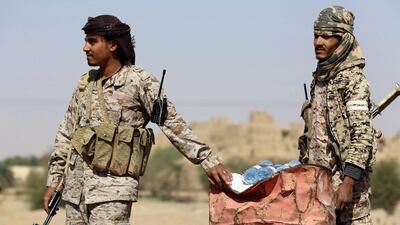Elite security forces in Yemen backed by the Arab coalition on Friday liberated one of the largest strongholds of the Al Qaeda militant group in the war-ravaged country, according to the unit’s commander, as the military announced a new operation named “Black Mountains” to deal further heavy blows to the group.
Soldiers recaptured the area of Rafadh Al Rays, which is located in the Azzan area that sits in the southeast of Shabwa province, Colonel Mohammed Salem Al Buhar, commander of the elite forces in Shabwa, confirmed to The National.
The operation included two strikes conducted by the Arab Coalition air forces that killed several Al-Qaeda militants, and the arrest of two Al-Qaeda militants in the “fierce confrontations”, Mr Al Buhar said.
"Our forces stormed the Rafadh Al Rays area as a part of a military plan to clean Shabwa province of Al Qaeda presence. This military operation comes as an extension to the previously released operations to liberate the areas of Al Hawta and Al-Said, in addition to the rural areas to the southeast of Shabwa on the border with Abyan province", he added.
On Saturday, the Yemeni military, with the support of the Arab coalition, announced a new operation against Al Qaeda in the neighbouring province of Hadramaut. It began on the request of Staff Major General Faraj Salmeen Al Bohsoni, Governor of Hadramaut.
It began after the group had been “expelled from the entire coastline of the Hadramaut Governorate”, which neighbours Shabwa, and its aim was to “chase them into the mountainous areas”, Emirati news agency WAM reported.
Al Qaeda’s strongest arm, known as Al Qaeda in the Arabian Peninsula, is present in Yemen, and has carried out a series of deadly bomb and shooting attacks in recent years, particularly in the country’s southern regions and against the military that operates in support of President Abd-Rabbu Mansour Hadi, who leads the internationally-recognised government in Yemen.
Yemeni security forces said they also killed a senior ISIS commander on Saturday in a gunbattle in Aden. The death of Saleh Nasser Fadhl Al Bakshi is a significant blow to the militant group in the country. An Aden police spokesperson confirmed Al Bakshi's death in an email to The National.
_____________
Read more:
Houthi rebels' No 2 killed in coalition airstrike
The spark in the Houthi coup — Saleh Al Sammad
_____________
Counterterrorism forces surrounded Al Bakshi in a building, according to a statement on the Aden police Facebook page, when he and fellow militants refused to surrender.
Al Bakshi held the title of “Prince” for the Aden region of the militant group’s Yemen affiliate.
The extremist group has conducted a series of bomb and shooting attacks against security forces in the southern regions of Yemen, killing hundreds in the three years that it has operated in the country.
The United States is assisting Yemen in its battle to defeat the militant groups, tripling its number of air strikes in the country last year against Al Qaeda. But, while the US and its allies have managed to somewhat defeat ISIS in Iraq and Syria, the threat from the group and its extremist rival remains in Yemen.
The civil war that has engulfed the country since the Iran-backed Houthi rebels overran the capital Sana’a in March 2015 has opened up a vacuum in Yemen that Al Qaeda and ISIS have been able to exploit to grow in influence. One of the deadliest extremist attacks in the civil war came in March 2015 when ISIS targeted two Shiite mosques in Sana’a, killing 142 people.
While ISIS has successfully conducted high-profile attacks, Al Qaeda managed to take control of large areas of the country’s south, including the city of Al Mukalla, Yemen’s fifth-largest city. It has carried out attacks on security forces in the south and has used the country as a planning base for international plots. Its notorious bombmaker Ibrahim Hassan Al Asiri remains at large and one of the most wanted extremists in the world.

